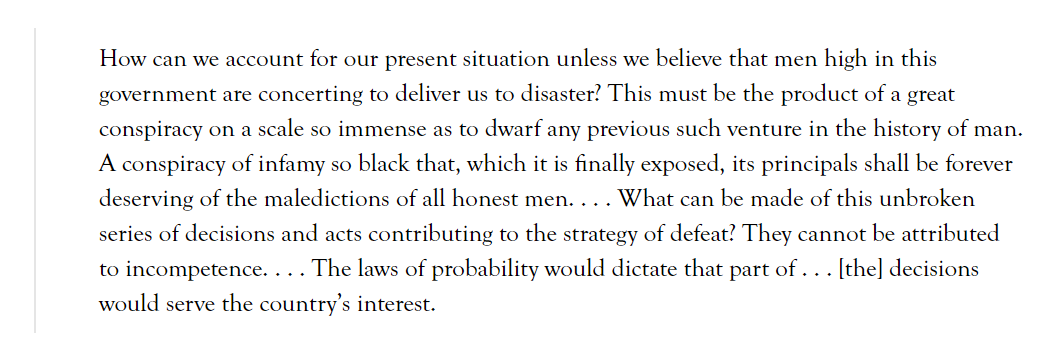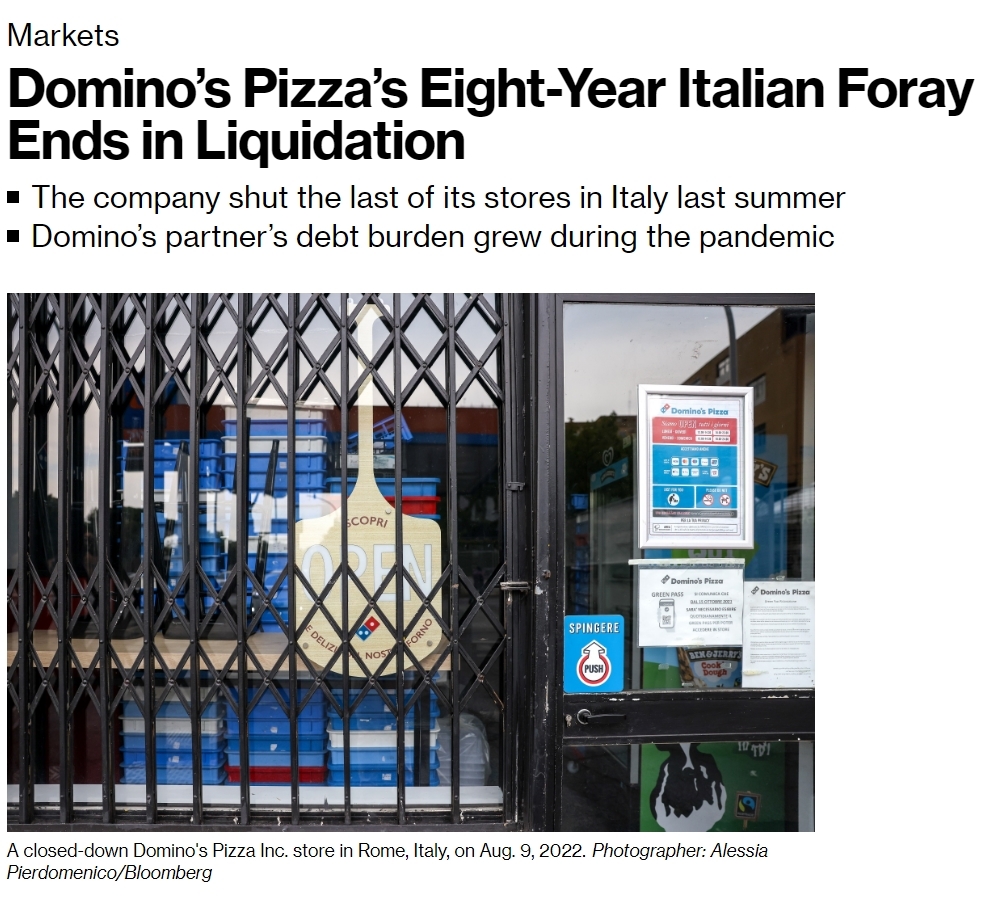Welcome to DU!
The truly grassroots left-of-center political community where regular people, not algorithms, drive the discussions and set the standards.
Join the community:
Create a free account
Support DU (and get rid of ads!):
Become a Star Member
Latest Breaking News
General Discussion
The DU Lounge
All Forums
Issue Forums
Culture Forums
Alliance Forums
Region Forums
Support Forums
Help & Search
Celerity
Celerity's Journal
Celerity's Journal
March 25, 2023
https://twitter.com/EliotHiggins













































Fake images of Trump arrest show 'giant step' for AI's disruptive power (the pics added as a bonus)
The tech’s capabilities and accessibility have vastly outpaced regulatory and legislative responses, as well as corporate controls
https://www.washingtonpost.com/politics/2023/03/22/trump-arrest-deepfakes/
https://archive.is/xAJOa
Eliot Higgins, the founder of the open-source investigative outlet Bellingcat, was reading this week about the expected indictment of Donald Trump when he decided he wanted to visualize it. He turned to an AI art generator, giving the technology simple prompts, such as, “Donald Trump falling down while being arrested.”
He shared the results — images of the former president surrounded by officers, their badges blurry and indistinct — on Twitter. “Making pictures of Trump getting arrested while waiting for Trump’s arrest,” he wrote. “I was just mucking about,” Higgins said in an interview. “I thought maybe five people would retweet it.”
Two days later, his posts depicting an event that never happened have been viewed nearly 5 million times, creating a case study in the increasing sophistication of AI-generated images, the ease with which they can be deployed and their potential to create confusion in volatile news environments. The episode also makes evident the absence of corporate standards or government regulation addressing the use of AI to create and spread falsehoods.
“Policymakers have been warning for years about the potential misuse of synthetic media to spread disinformation and more generally to sow confusion and discord,” said Sen. Mark R. Warner (D-Va.), the chairman of the Senate Intelligence Committee. “While it took a few years for the capabilities to catch up, we’re now at a point where these tools are widely available and incredibly capable.”
snip
https://www.washingtonpost.com/politics/2023/03/22/trump-arrest-deepfakes/
https://archive.is/xAJOa
Eliot Higgins, the founder of the open-source investigative outlet Bellingcat, was reading this week about the expected indictment of Donald Trump when he decided he wanted to visualize it. He turned to an AI art generator, giving the technology simple prompts, such as, “Donald Trump falling down while being arrested.”
He shared the results — images of the former president surrounded by officers, their badges blurry and indistinct — on Twitter. “Making pictures of Trump getting arrested while waiting for Trump’s arrest,” he wrote. “I was just mucking about,” Higgins said in an interview. “I thought maybe five people would retweet it.”
Two days later, his posts depicting an event that never happened have been viewed nearly 5 million times, creating a case study in the increasing sophistication of AI-generated images, the ease with which they can be deployed and their potential to create confusion in volatile news environments. The episode also makes evident the absence of corporate standards or government regulation addressing the use of AI to create and spread falsehoods.
“Policymakers have been warning for years about the potential misuse of synthetic media to spread disinformation and more generally to sow confusion and discord,” said Sen. Mark R. Warner (D-Va.), the chairman of the Senate Intelligence Committee. “While it took a few years for the capabilities to catch up, we’re now at a point where these tools are widely available and incredibly capable.”
snip
https://twitter.com/EliotHiggins













































March 25, 2023
https://www.thrillist.com/events/new-york/pickleball-central-park-wollman-rink

Pickleball is the newest baddie of the sports world. And on the heels of the latest (and astonishing) statistic that there are more than 36 million picklers across the country, Wollman Rink and CityPickle have teamed up to transform the iconic Central Park rink into a temporary home for 14 bright blue pickleball courts.
From Friday, April 7 to Monday, October 9, New Yorkers will be able to play the mix of tennis, badminton, and ping pong at one of the city’s most legendary landmarks through hour-long court rentals (from $80 per hour) every day of the week from 7 am–9 pm.
For all the newbies out there, each game of pickleball spans around 10 to 15 minutes, so each rental period affords plenty of time for working on form and getting the competitive energies flowing. CityPickle, New York City’s official pickleball club, will also be offering $6 paddle rentals for those who haven’t committed to purchasing a personal kit. And if the shiny new courts inspire you to up your game, picklers can also sign up for lessons, clinics, leagues, and tournaments run by CityPickle.
CityPickle and Wollman Park Partners (Equinox, Related, HB Sports & Entertainment) are also behind meaningful programming with organizations like the Challenged Athletes Foundation, Boys Club of New York, YMCA of Greater New York, Solutions Now, and Fountain House to provide free play, coaching, and camps at the new courts, in an effort to uplift our local community. CityPickle at Wollman Rink opens on Friday, April 7 at 7 am in Central Park.
snip
Central Park Is the Newest Hotspot for Pickleball in NYC
The hottest new baddie of the sports world is taking over Wollman Rink.https://www.thrillist.com/events/new-york/pickleball-central-park-wollman-rink

Pickleball is the newest baddie of the sports world. And on the heels of the latest (and astonishing) statistic that there are more than 36 million picklers across the country, Wollman Rink and CityPickle have teamed up to transform the iconic Central Park rink into a temporary home for 14 bright blue pickleball courts.
From Friday, April 7 to Monday, October 9, New Yorkers will be able to play the mix of tennis, badminton, and ping pong at one of the city’s most legendary landmarks through hour-long court rentals (from $80 per hour) every day of the week from 7 am–9 pm.
For all the newbies out there, each game of pickleball spans around 10 to 15 minutes, so each rental period affords plenty of time for working on form and getting the competitive energies flowing. CityPickle, New York City’s official pickleball club, will also be offering $6 paddle rentals for those who haven’t committed to purchasing a personal kit. And if the shiny new courts inspire you to up your game, picklers can also sign up for lessons, clinics, leagues, and tournaments run by CityPickle.
CityPickle and Wollman Park Partners (Equinox, Related, HB Sports & Entertainment) are also behind meaningful programming with organizations like the Challenged Athletes Foundation, Boys Club of New York, YMCA of Greater New York, Solutions Now, and Fountain House to provide free play, coaching, and camps at the new courts, in an effort to uplift our local community. CityPickle at Wollman Rink opens on Friday, April 7 at 7 am in Central Park.
snip
March 25, 2023

Report highlights gendered disinformation online and calls for women-centred reform of ‘social media’ platforms.
https://www.socialeurope.eu/hungarys-perfect-propaganda-machine-attacks-women

Ágnes Kunhalmi, a vocal critic of Viktor Orbán, speaking with the German chancellor, Olaf Scholz, at the Party of European Socialists congress in Berlin last October
Women in Hungary who speak out against the autocratic actions of the government of Viktor Orbán face vicious misogynistic attacks online, according to a new report from #ShePersisted, a global initiative based in the United States combating gendered disinformation against women in politics. The study, A Perfect Propaganda Machine, investigates how Orbán’s far-right Fidesz party uses ‘social media’ to silence and undermine political opponents, especially women, through disinformation campaigns, online harassment and doxxing. The research involved interviews with Hungarian women political leaders, public figures and activists, as well as the monitoring of ‘social media’ in the country.
‘This “perfect propaganda machine” element was unique to Hungary,’ said the Italian gender expert Lucina Di Meco, co-founder of #ShePersisted and co-author of the report. ‘The media environment has been entirely taken over by the governing party.’ Since 2018, the Hungarian government has consolidated more than 450 media outlets under the pro-government Central European Press and Media Foundation (KESMA), which is controlled by an ex-Fidesz leader. Almost 78 per cent of Hungary’s news and public affairs media are pro-Fidesz, according to the media monitor Mertek.
Big Tech failure
Hungary is the first of five country case studies to be released in #ShePersisted’s ‘Monetising Misogyny’ series. The other countries are Brazil, India, Italy (whose report was published on the same day as Hungary’s, March 21st) and Tunisia. Across these countries, #ShePersisted found that Big Tech companies had failed to address gendered disinformation attacks against women in politics on their ‘social media’ platforms. The initiative is calling for the reform of digital-platform standards via negotiations driven by women leaders.
In Hungary, the most common disinformation narratives used against women in politics include portraying them as ‘untrustworthy’ or ‘foreign agents’ trying to ‘destroy conservative norms’, tied in some way to the Hungarian-American businessman and philanthropist George Soros, the report says. The Russian president, Vladimir Putin, with whom Orbán often aligns himself in defending ‘traditional values’, banned Soros’ Open Society Foundation, along with other pro-democracy groups, from operating in Russia in 2015. Women leaders and activists who stand up for human rights and champion democracy are also denigrated as ‘unqualified’, ‘stupid’ and ‘unfit for office’, the report finds. They are further accused of misappropriating public funds for personal gain or acting as ‘weak puppets’ for powerful male leaders on the left.
snip
Hungary's 'propaganda machine' attacks women

Report highlights gendered disinformation online and calls for women-centred reform of ‘social media’ platforms.
https://www.socialeurope.eu/hungarys-perfect-propaganda-machine-attacks-women

Ágnes Kunhalmi, a vocal critic of Viktor Orbán, speaking with the German chancellor, Olaf Scholz, at the Party of European Socialists congress in Berlin last October
Women in Hungary who speak out against the autocratic actions of the government of Viktor Orbán face vicious misogynistic attacks online, according to a new report from #ShePersisted, a global initiative based in the United States combating gendered disinformation against women in politics. The study, A Perfect Propaganda Machine, investigates how Orbán’s far-right Fidesz party uses ‘social media’ to silence and undermine political opponents, especially women, through disinformation campaigns, online harassment and doxxing. The research involved interviews with Hungarian women political leaders, public figures and activists, as well as the monitoring of ‘social media’ in the country.
‘This “perfect propaganda machine” element was unique to Hungary,’ said the Italian gender expert Lucina Di Meco, co-founder of #ShePersisted and co-author of the report. ‘The media environment has been entirely taken over by the governing party.’ Since 2018, the Hungarian government has consolidated more than 450 media outlets under the pro-government Central European Press and Media Foundation (KESMA), which is controlled by an ex-Fidesz leader. Almost 78 per cent of Hungary’s news and public affairs media are pro-Fidesz, according to the media monitor Mertek.
Big Tech failure
Hungary is the first of five country case studies to be released in #ShePersisted’s ‘Monetising Misogyny’ series. The other countries are Brazil, India, Italy (whose report was published on the same day as Hungary’s, March 21st) and Tunisia. Across these countries, #ShePersisted found that Big Tech companies had failed to address gendered disinformation attacks against women in politics on their ‘social media’ platforms. The initiative is calling for the reform of digital-platform standards via negotiations driven by women leaders.
In Hungary, the most common disinformation narratives used against women in politics include portraying them as ‘untrustworthy’ or ‘foreign agents’ trying to ‘destroy conservative norms’, tied in some way to the Hungarian-American businessman and philanthropist George Soros, the report says. The Russian president, Vladimir Putin, with whom Orbán often aligns himself in defending ‘traditional values’, banned Soros’ Open Society Foundation, along with other pro-democracy groups, from operating in Russia in 2015. Women leaders and activists who stand up for human rights and champion democracy are also denigrated as ‘unqualified’, ‘stupid’ and ‘unfit for office’, the report finds. They are further accused of misappropriating public funds for personal gain or acting as ‘weak puppets’ for powerful male leaders on the left.
snip
March 25, 2023
https://www.ft.com/content/151cb429-d024-4d5c-9edf-5b4a2b104a66

There is a strong correlation between the rising share of corporate profits in gross domestic product and the sharp price rises in the US after the Covid pandemic, according to a paper published by the University of Massachusetts.
Having made windfall profits on the back of commodity price fluctuations and supply bottlenecks, large companies have been emboldened to raise prices further to increase profit margins.
They found that there was little evidence that the models used to explain the inflation of the 1970s — such as excess aggregate demand, money supply expansion or increased wage costs that prompted a spiral — applied to this recent rise. Covid-19 price rises are predominantly a sellers’ inflation, they say. Where cost increases are being experienced by all their competitors, companies have felt safe to pass them on in the expectation of an “implicit agreement” that rivals will do the same.
Profit margins of US companies have reached levels not seen since the aftermath of WWII
Unchecked corporate pricing power is a factor in US inflationhttps://www.ft.com/content/151cb429-d024-4d5c-9edf-5b4a2b104a66

There is a strong correlation between the rising share of corporate profits in gross domestic product and the sharp price rises in the US after the Covid pandemic, according to a paper published by the University of Massachusetts.
Having made windfall profits on the back of commodity price fluctuations and supply bottlenecks, large companies have been emboldened to raise prices further to increase profit margins.
They found that there was little evidence that the models used to explain the inflation of the 1970s — such as excess aggregate demand, money supply expansion or increased wage costs that prompted a spiral — applied to this recent rise. Covid-19 price rises are predominantly a sellers’ inflation, they say. Where cost increases are being experienced by all their competitors, companies have felt safe to pass them on in the expectation of an “implicit agreement” that rivals will do the same.
March 25, 2023

From Pulp Era pioneers to the radical innovators of the 1960s and ’70s, visionary women writers have been a transformative force in American science fiction. For Women’s History Month, acclaimed SF authors Chelsea Quinn Yarbro, Pamela Sargent, and Sheree Renée Thomas join Lisa Yaszek, editor of LOA’s The Future Is Female!, for a conversation about the writers who smashed the genre’s gender barrier to create worlds and works that remain revolutionary.
We thank our promotional partners: the Association of Literary Scholars, Critics, and Writers, Dottir Press, and the Science Fiction and Fantasy Writers Association.
The Library of America (LOA) is a non-profit publisher of classic American literature. Founded in 1979 with seed money from the National Endowment for the Humanities and the Ford Foundation, the LOA has published over 300 volumes by authors ranging from Mark Twain to Philip Roth, Nathaniel Hawthorne to Saul Bellow, including selected writing of several U.S. presidents.
Library of America Presents: Back to the Future Is Female!: Visionary women science fiction writers.

From Pulp Era pioneers to the radical innovators of the 1960s and ’70s, visionary women writers have been a transformative force in American science fiction. For Women’s History Month, acclaimed SF authors Chelsea Quinn Yarbro, Pamela Sargent, and Sheree Renée Thomas join Lisa Yaszek, editor of LOA’s The Future Is Female!, for a conversation about the writers who smashed the genre’s gender barrier to create worlds and works that remain revolutionary.
We thank our promotional partners: the Association of Literary Scholars, Critics, and Writers, Dottir Press, and the Science Fiction and Fantasy Writers Association.
The Library of America (LOA) is a non-profit publisher of classic American literature. Founded in 1979 with seed money from the National Endowment for the Humanities and the Ford Foundation, the LOA has published over 300 volumes by authors ranging from Mark Twain to Philip Roth, Nathaniel Hawthorne to Saul Bellow, including selected writing of several U.S. presidents.
March 25, 2023
https://harpers.org/archive/1964/11/the-paranoid-style-in-american-politics/
American politics has often been an arena for angry minds. In recent years we have seen angry minds at work mainly among extreme right-wingers, who have now demonstrated in the Goldwater movement how much political leverage can be got out of the animosities and passions of a small minority. But behind this I believe there is a style of mind that is far from new and that is not necessarily right-wing. I call it the paranoid style simply because no other word adequately evokes the sense of heated exaggeration, suspiciousness, and conspiratorial fantasy that I have in mind. In using the expression “paranoid style” I am not speaking in a clinical sense, but borrowing a clinical term for other purposes. I have neither the competence nor the desire to classify any figures of the past or present as certifiable lunatics. In fact, the idea of the paranoid style as a force in politics would have little contemporary relevance or historical value if it were applied only to men with profoundly disturbed minds. It is the use of paranoid modes of expression by more or less normal people that makes the phenomenon significant.
Of course this term is pejorative, and it is meant to be; the paranoid style has a greater affinity for bad causes than good. But nothing really prevents a sound program or demand from being advocated in the paranoid style. Style has more to do with the way in which ideas are believed than with the truth or falsity of their content. I am interested here in getting at our political psychology through our political rhetoric. The paranoid style is an old and recurrent phenomenon in our public life which has been frequently linked with movements of suspicious discontent. Here is Senator McCarthy, speaking in June 1951 about the parlous situation of the United States:

Now turn back fifty years to a manifesto signed in 1895 by a number of leaders of the Populist party:

Next, a Texas newspaper article of 1855:

These quotations give the keynote of the style. In the history of the United States one find it, for example, in the anti-Masonic movement, the nativist and anti-Catholic movement, in certain spokesmen of abolitionism who regarded the United States as being in the grip of a slaveholders’ conspiracy, in many alarmists about the Mormons, in some Greenback and Populist writers who constructed a great conspiracy of international bankers, in the exposure of a munitions makers’ conspiracy of World War I, in the popular left-wing press, in the contemporary American right wing, and on both sides of the race controversy today, among White Citizens’ Councils and Black Muslims. I do not propose to try to trace the variations of the paranoid style that can be found in all these movements, but will confine myself to a few leading episodes in our past history in which the style emerged in full and archetypal splendor.
Illuminism and Masonry
I begin with a particularly revealing episode—the panic that broke out in some quarters at the end of the eighteenth century over the allegedly subversive activities of the Bavarian Illuminati. This panic was a part of the general reaction to the French Revolution. In the United States it was heightened by the response of certain men, mostly in New England and among the established clergy, to the rise of Jeffersonian democracy. Illuminism had been started in 1776 by Adam Weishaupt, a professor of law at the University of Ingolstadt. Its teachings today seem to be no more than another version of Enlightenment rationalism, spiced with the anticlerical atmosphere of eighteenth-century Bavaria. It was a somewhat naïve and utopian movement which aspired ultimately to bring the human race under the rules of reason. Its humanitarian rationalism appears to have acquired a fairly wide influence in Masonic lodges.
snip


related
Sean Wilentz: Richard Hofstadter and the “paranoid style” as an American phenomenon
INTERVIEWS
September 15, 2020
https://www.loa.org/news-and-views/1735-sean-wilentz-richard-hofstadter-and-the-paranoid-style-as-an-american-phenomenon
Released this spring, Library of America’s collection Richard Hofstadter: Anti-Intellectualism in American Life, The Paranoid Style in American Politics, Uncollected Essays 1956-1965 gathers together an indispensable historian’s essential works on the irrationalism, demagoguery, and conspiratorial thinking that have long influenced American politics and culture. The pertinence of Hofstadter’s preoccupations to the contemporary American moment can hardly be overstated: In the last few months alone, for instance, New Yorker writers Jelani Cobb, Luke Mogelson, and David Remnick have all cited Hofstadter’s work as a touchstone for making sense of events in 2020.
The editor of LOA’s Hofstadter volume is Sean Wilentz, George Henry Davis 1886 Professor of American History at Princeton University. His many books include The Politicians and the Egalitarians: The Hidden History of American Politics (2016); Bob Dylan in America (2010); and The Age of Reagan: A History, 1974–2008 (2008). The Rise of American Democracy: Jefferson to Lincoln (2005) was awarded the Bancroft Prize, and he has received two Grammy nominations for his writings on music. Earlier this year, Wilentz participated in Library of America’s webinar on the anthology American Conservatism: Reclaiming an Intellectual Tradition with that book’s editor, Andrew J. Bacevich. Via email, Wilentz answered our questions about Hofstadter and the unmistakable relevance of his work in 2020.
snip
The Paranoid Style in American Politics - by Richard Hofstadter (Harper's Magazine, 1964)
It had been around a long time before the Radical Right discovered it—and its targets have ranged from “the international bankers” to Masons, Jesuits, and munitions makers.https://harpers.org/archive/1964/11/the-paranoid-style-in-american-politics/
American politics has often been an arena for angry minds. In recent years we have seen angry minds at work mainly among extreme right-wingers, who have now demonstrated in the Goldwater movement how much political leverage can be got out of the animosities and passions of a small minority. But behind this I believe there is a style of mind that is far from new and that is not necessarily right-wing. I call it the paranoid style simply because no other word adequately evokes the sense of heated exaggeration, suspiciousness, and conspiratorial fantasy that I have in mind. In using the expression “paranoid style” I am not speaking in a clinical sense, but borrowing a clinical term for other purposes. I have neither the competence nor the desire to classify any figures of the past or present as certifiable lunatics. In fact, the idea of the paranoid style as a force in politics would have little contemporary relevance or historical value if it were applied only to men with profoundly disturbed minds. It is the use of paranoid modes of expression by more or less normal people that makes the phenomenon significant.
Of course this term is pejorative, and it is meant to be; the paranoid style has a greater affinity for bad causes than good. But nothing really prevents a sound program or demand from being advocated in the paranoid style. Style has more to do with the way in which ideas are believed than with the truth or falsity of their content. I am interested here in getting at our political psychology through our political rhetoric. The paranoid style is an old and recurrent phenomenon in our public life which has been frequently linked with movements of suspicious discontent. Here is Senator McCarthy, speaking in June 1951 about the parlous situation of the United States:

Now turn back fifty years to a manifesto signed in 1895 by a number of leaders of the Populist party:

Next, a Texas newspaper article of 1855:

These quotations give the keynote of the style. In the history of the United States one find it, for example, in the anti-Masonic movement, the nativist and anti-Catholic movement, in certain spokesmen of abolitionism who regarded the United States as being in the grip of a slaveholders’ conspiracy, in many alarmists about the Mormons, in some Greenback and Populist writers who constructed a great conspiracy of international bankers, in the exposure of a munitions makers’ conspiracy of World War I, in the popular left-wing press, in the contemporary American right wing, and on both sides of the race controversy today, among White Citizens’ Councils and Black Muslims. I do not propose to try to trace the variations of the paranoid style that can be found in all these movements, but will confine myself to a few leading episodes in our past history in which the style emerged in full and archetypal splendor.
Illuminism and Masonry
I begin with a particularly revealing episode—the panic that broke out in some quarters at the end of the eighteenth century over the allegedly subversive activities of the Bavarian Illuminati. This panic was a part of the general reaction to the French Revolution. In the United States it was heightened by the response of certain men, mostly in New England and among the established clergy, to the rise of Jeffersonian democracy. Illuminism had been started in 1776 by Adam Weishaupt, a professor of law at the University of Ingolstadt. Its teachings today seem to be no more than another version of Enlightenment rationalism, spiced with the anticlerical atmosphere of eighteenth-century Bavaria. It was a somewhat naïve and utopian movement which aspired ultimately to bring the human race under the rules of reason. Its humanitarian rationalism appears to have acquired a fairly wide influence in Masonic lodges.
snip


related
Sean Wilentz: Richard Hofstadter and the “paranoid style” as an American phenomenon
INTERVIEWS
September 15, 2020
https://www.loa.org/news-and-views/1735-sean-wilentz-richard-hofstadter-and-the-paranoid-style-as-an-american-phenomenon
Released this spring, Library of America’s collection Richard Hofstadter: Anti-Intellectualism in American Life, The Paranoid Style in American Politics, Uncollected Essays 1956-1965 gathers together an indispensable historian’s essential works on the irrationalism, demagoguery, and conspiratorial thinking that have long influenced American politics and culture. The pertinence of Hofstadter’s preoccupations to the contemporary American moment can hardly be overstated: In the last few months alone, for instance, New Yorker writers Jelani Cobb, Luke Mogelson, and David Remnick have all cited Hofstadter’s work as a touchstone for making sense of events in 2020.
The editor of LOA’s Hofstadter volume is Sean Wilentz, George Henry Davis 1886 Professor of American History at Princeton University. His many books include The Politicians and the Egalitarians: The Hidden History of American Politics (2016); Bob Dylan in America (2010); and The Age of Reagan: A History, 1974–2008 (2008). The Rise of American Democracy: Jefferson to Lincoln (2005) was awarded the Bancroft Prize, and he has received two Grammy nominations for his writings on music. Earlier this year, Wilentz participated in Library of America’s webinar on the anthology American Conservatism: Reclaiming an Intellectual Tradition with that book’s editor, Andrew J. Bacevich. Via email, Wilentz answered our questions about Hofstadter and the unmistakable relevance of his work in 2020.
Library of America: The new Library of America volume argues for Richard Hofstadter’s prescience in understanding the role of resentment, suspicion of elites, and conspiratorial thinking in American political culture. Why do you think Hofstadter was alert to—and interested in—these tendencies ahead of other historians?
Sean Wilentz: Richard Hofstadter, after starting out in the Marxist ’30s, became increasingly alert to the myths and irrationalities of American politics and culture. Other historians in his cohort—like his colleagues Kenneth Stampp and Frank Freidel during their early teaching days together at the University of Maryland—were blazing new trails but were involved in more familiar scholarly pursuits. In grappling with ideas and politics as they did not, with a certain Mencken-like acerbity, Hofstadter quickly detected self-serving fables and folly, though without dismissing the value and honor of his subjects. In The American Political Tradition, published in 1948, he debunked the leftist and liberal myths surrounding mainstream figures from the Founders through FDR. After McCarthyism hit, he turned to the anxieties and obsessions of popular movements and cultural trends, as examined first in Anti-Intellectualism in American Life and then in The Paranoid Style in American Politics.
Sean Wilentz: Richard Hofstadter, after starting out in the Marxist ’30s, became increasingly alert to the myths and irrationalities of American politics and culture. Other historians in his cohort—like his colleagues Kenneth Stampp and Frank Freidel during their early teaching days together at the University of Maryland—were blazing new trails but were involved in more familiar scholarly pursuits. In grappling with ideas and politics as they did not, with a certain Mencken-like acerbity, Hofstadter quickly detected self-serving fables and folly, though without dismissing the value and honor of his subjects. In The American Political Tradition, published in 1948, he debunked the leftist and liberal myths surrounding mainstream figures from the Founders through FDR. After McCarthyism hit, he turned to the anxieties and obsessions of popular movements and cultural trends, as examined first in Anti-Intellectualism in American Life and then in The Paranoid Style in American Politics.
snip
March 25, 2023
related
Dan Kelly appears at event headlined by pastor who advocated for killing abortion providers,
compared COVID-19 policies to Holocaust
https://eu.jsonline.com/story/news/politics/2023/03/23/wisconsin-supreme-court-candidate-daniel-kelly-appears-event-anti-abortion-pastor-matthew-trewhella/70037649007/
MADISON - Wisconsin Supreme Court candidate Dan Kelly appeared at an event Tuesday in western Wisconsin headlined by a Brookfield pastor who has called the murder of an abortion provider "justifiable homicide," advocated for the creation of anti-abortion-focused militia and compared coronavirus pandemic-related mask mandates to the Holocaust.
The Wisconsin chapter of the Sons and Daughters of Liberty, which characterizes itself as "Christian Patriots dedicated to restoring our Constitutional Republic and defending liberty," hosted Matthew Trewhella at an event in St. Croix County on Tuesday evening, where the pastor compared COVID-19 rules to the Holocaust and told attendees to reject mandates from government officials or else risk being forced to resort to violence.

Matthew Trewhella
"You cannot appease tyrants. You have to defeat them. And the sooner you decide not to comply, and to defeat them privately not comply with evil, publicly join with other good men and magistrates (to) stand against the evil, the better chance you have of stopping evil," Trewhella told a crowd gathered at the Calvary Assembly of God in Wilson. "If you keep accommodating yourself — guess what? — you’ll be swallowed up by evil. It will be too late and then bloody revolution is the only option left.”
snip
Kelly's liberal opponent Janet Protasiewicz, a Milwaukee County judge, said Kelly's appearance amounted to support for anti-abortion and anti-democracy views. The two face off in the April 4 general election. "You may have heard me say Dan Kelly is an extremist. Well, although it’s shocking that he would share the stage with this man, it’s not surprising," Protasiewicz said in a statement. "Dan Kelly’s radical views defending the 1849 abortion ban, and generally stopping women from controlling their own bodies, are well-documented. And his support for disrespecting democracy and overturning elections is well-documented. We can’t let him anywhere close to our Supreme Court."
snip
https://eu.jsonline.com/story/news/politics/2023/03/23/wisconsin-supreme-court-candidate-daniel-kelly-appears-event-anti-abortion-pastor-matthew-trewhella/70037649007/
MADISON - Wisconsin Supreme Court candidate Dan Kelly appeared at an event Tuesday in western Wisconsin headlined by a Brookfield pastor who has called the murder of an abortion provider "justifiable homicide," advocated for the creation of anti-abortion-focused militia and compared coronavirus pandemic-related mask mandates to the Holocaust.
The Wisconsin chapter of the Sons and Daughters of Liberty, which characterizes itself as "Christian Patriots dedicated to restoring our Constitutional Republic and defending liberty," hosted Matthew Trewhella at an event in St. Croix County on Tuesday evening, where the pastor compared COVID-19 rules to the Holocaust and told attendees to reject mandates from government officials or else risk being forced to resort to violence.

Matthew Trewhella
"You cannot appease tyrants. You have to defeat them. And the sooner you decide not to comply, and to defeat them privately not comply with evil, publicly join with other good men and magistrates (to) stand against the evil, the better chance you have of stopping evil," Trewhella told a crowd gathered at the Calvary Assembly of God in Wilson. "If you keep accommodating yourself — guess what? — you’ll be swallowed up by evil. It will be too late and then bloody revolution is the only option left.”
snip
Kelly's liberal opponent Janet Protasiewicz, a Milwaukee County judge, said Kelly's appearance amounted to support for anti-abortion and anti-democracy views. The two face off in the April 4 general election. "You may have heard me say Dan Kelly is an extremist. Well, although it’s shocking that he would share the stage with this man, it’s not surprising," Protasiewicz said in a statement. "Dan Kelly’s radical views defending the 1849 abortion ban, and generally stopping women from controlling their own bodies, are well-documented. And his support for disrespecting democracy and overturning elections is well-documented. We can’t let him anywhere close to our Supreme Court."
snip
related
Inside The Anti-Abortion Underground
BY MELINDA LIU ON 8/28/94 AT 8:00 PM EDT
https://www.newsweek.com/inside-anti-abortion-underground-187894
The Rev. Matt Trewhella, co-founder of Missionaries to the Pre-Born, a Milwaukee anti-abortion group, was boasting to an audience last May about his 16-month-old son, Jeremiah. Trewhella said he already knew to raise his index finger when asked, "Which is your trigger finger?" The crowd at a Wisconsin state convention of the ultraconservative U.S. Taxpayers Party also heard this recommendation from Trewhella: "This Christmas, I want you to do the most loving thing. I want you to buy each of your children an SKS rifle and 500 rounds of ammunition."
Trewhella says he would never kill a physician who performs abortions. Moreover, he insists that anyone in his mission who advocated violence "would be asked to leave." But after last month's murder of Pensacola, Fla., doctor John Britton, federal authorities aren't taking the 34-year-old pastor at his word. According to a confidential FBI document, Trewhella is one of a half dozen anti-abortion activists now under investigation as possible conspirators in a campaign of violence against abortion clinics. Currently serving a monthlong county-jail sentence for disorderly conduct during a demonstration at a Milwaukee doctor's home last year, Trewhella told Newsweek that the government's investigation is "all a big joke." He claims that his gun comments, captured on a videotape and released last week by the Planned Parenthood Federation of America, were "a lighthearted moment" snipped out of context.
Abortion-rights groups in Wisconsin aren't amused. Trewhella, a onetime Detroit street tough and convicted arsonist who says he experienced a religious awakening as a teenager, has helped turn Milwaukee into an abortion battleground. Over the last two years his followers, arrested by the hundreds, have strapped themselves to concrete blockades in front of clinics, trapped a doctor in his home and even picketed the soccer game of another's preteen son. One doctor, George Woodward, received an anonymous letter last year warning, "If you continue [to perform abortions] I will hunt you down like any other wild beast and kill you." Says Woodward: "I keep thinking, "Am I the next Dr. Britton?' "
When other Wisconsin anti-abortion groups issued statements condemning Britton's murder, Trewhella responded with a one-sentence communique calling on "pro-abortion leaders . . . to condemn the actions of abortionists everywhere." He also joined other activists last year in signing a statement declaring that Michael Griffin had committed "justifiable homicide" in the 1993 killing of David Gunn, another Pensacola abortion doctor. The author of the statement, Paul Hill, pleaded not guilty last week to charges of murdering Britton and a security escort. Trewhella said last week that he had removed his name from Hill's declaration when he sensed that Hill "had moved from a statement of belief to a position advocating violence."
snip
BY MELINDA LIU ON 8/28/94 AT 8:00 PM EDT
https://www.newsweek.com/inside-anti-abortion-underground-187894
The Rev. Matt Trewhella, co-founder of Missionaries to the Pre-Born, a Milwaukee anti-abortion group, was boasting to an audience last May about his 16-month-old son, Jeremiah. Trewhella said he already knew to raise his index finger when asked, "Which is your trigger finger?" The crowd at a Wisconsin state convention of the ultraconservative U.S. Taxpayers Party also heard this recommendation from Trewhella: "This Christmas, I want you to do the most loving thing. I want you to buy each of your children an SKS rifle and 500 rounds of ammunition."
Trewhella says he would never kill a physician who performs abortions. Moreover, he insists that anyone in his mission who advocated violence "would be asked to leave." But after last month's murder of Pensacola, Fla., doctor John Britton, federal authorities aren't taking the 34-year-old pastor at his word. According to a confidential FBI document, Trewhella is one of a half dozen anti-abortion activists now under investigation as possible conspirators in a campaign of violence against abortion clinics. Currently serving a monthlong county-jail sentence for disorderly conduct during a demonstration at a Milwaukee doctor's home last year, Trewhella told Newsweek that the government's investigation is "all a big joke." He claims that his gun comments, captured on a videotape and released last week by the Planned Parenthood Federation of America, were "a lighthearted moment" snipped out of context.
Abortion-rights groups in Wisconsin aren't amused. Trewhella, a onetime Detroit street tough and convicted arsonist who says he experienced a religious awakening as a teenager, has helped turn Milwaukee into an abortion battleground. Over the last two years his followers, arrested by the hundreds, have strapped themselves to concrete blockades in front of clinics, trapped a doctor in his home and even picketed the soccer game of another's preteen son. One doctor, George Woodward, received an anonymous letter last year warning, "If you continue [to perform abortions] I will hunt you down like any other wild beast and kill you." Says Woodward: "I keep thinking, "Am I the next Dr. Britton?' "
When other Wisconsin anti-abortion groups issued statements condemning Britton's murder, Trewhella responded with a one-sentence communique calling on "pro-abortion leaders . . . to condemn the actions of abortionists everywhere." He also joined other activists last year in signing a statement declaring that Michael Griffin had committed "justifiable homicide" in the 1993 killing of David Gunn, another Pensacola abortion doctor. The author of the statement, Paul Hill, pleaded not guilty last week to charges of murdering Britton and a security escort. Trewhella said last week that he had removed his name from Hill's declaration when he sensed that Hill "had moved from a statement of belief to a position advocating violence."
snip
March 23, 2023
https://www.bloomberg.com/news/articles/2023-03-22/domino-s-pizza-s-eight-year-italian-foray-ends-in-liquidation
https://archive.is/rWSaL

Domino’s Pizza Inc.’s franchise in Italy has entered into liquidation, after a short-lived struggle to win over customers in the birthplace of pizza. A Milan-based judge opened liquidation proceedings for Domino’s franchise partner, ePizza SpA, last week, according to a filing with the local chamber of commerce seen by Bloomberg News.
A court-ordered liquidation could result in a recovery for creditors of 5% of their exposure, according to a draft restructuring plan seen by Bloomberg News that was submitted last year by the Milan-based firm and its financial advisors.
The last of Domino’s 29 Italian branches closed last summer, ending a foray that began in 2015 with the US brand touting pizza toppings that included pineapple and barbecue chicken, an unusual take in a country more accustomed to thin-crust margheritas. Over the years, the American fast-food chain’s partner borrowed heavily for ambitious plans to open 880 stores.
The pandemic, however, hobbled ePizza. Covid-related lockdowns deprived the company of 35% of its revenues from 2020, as did rising competition. Once largely bricks-and-mortar focused, Italian pizzerias ramped up their home delivery offerings through third-party services such as Deliveroo Plc or Glovo, hurting demand for Domino’s pies.
snip
Domino's Pizza tried to make it in Italy. After 8 years, it's ended in liquidation.
https://twitter.com/business/status/1638840028385398785https://www.bloomberg.com/news/articles/2023-03-22/domino-s-pizza-s-eight-year-italian-foray-ends-in-liquidation
https://archive.is/rWSaL

Domino’s Pizza Inc.’s franchise in Italy has entered into liquidation, after a short-lived struggle to win over customers in the birthplace of pizza. A Milan-based judge opened liquidation proceedings for Domino’s franchise partner, ePizza SpA, last week, according to a filing with the local chamber of commerce seen by Bloomberg News.
A court-ordered liquidation could result in a recovery for creditors of 5% of their exposure, according to a draft restructuring plan seen by Bloomberg News that was submitted last year by the Milan-based firm and its financial advisors.
The last of Domino’s 29 Italian branches closed last summer, ending a foray that began in 2015 with the US brand touting pizza toppings that included pineapple and barbecue chicken, an unusual take in a country more accustomed to thin-crust margheritas. Over the years, the American fast-food chain’s partner borrowed heavily for ambitious plans to open 880 stores.
The pandemic, however, hobbled ePizza. Covid-related lockdowns deprived the company of 35% of its revenues from 2020, as did rising competition. Once largely bricks-and-mortar focused, Italian pizzerias ramped up their home delivery offerings through third-party services such as Deliveroo Plc or Glovo, hurting demand for Domino’s pies.
snip
March 23, 2023

https://www.etui.org/sites/default/files/2023-03/Benchmarking%20Working%20Europe%202023_Towards%20sustainable%20resilience_2023.pdf (free download)

Benchmarking Working Europe 2023 Europe in transition - Towards sustainable resilience (free e-book)
https://www.etui.org/publications/benchmarking-working-europe-2023
https://www.etui.org/sites/default/files/2023-03/Benchmarking%20Working%20Europe%202023_Towards%20sustainable%20resilience_2023.pdf (free download)
The central questions and main contextual background explored by this year’s issue of Benchmarking are, at their core, fairly straightforward. Europe is at a crossroads, painfully navigating four transitions at once: a (perhaps less than obvious) economic policy transition best exemplified by the debates surrounding the EU economic governance framework (COM(2022) 583 final); a geopolitical transition, increasingly shaped by the ‘open strategic autonomy’ debate (Akgüç 2021) and, of course, by the Russian war of aggression on Ukraine; and the two more readily acknowledged green and digital transitions. It is, however, becoming increasingly clear, as explored in greater detail in the following chapters, that these four transitions imply important trade-offs and have significant ramifications for the social dimension of the European project and for the livelihoods of European workers. These consequences are currently being ignored by the principal institutional actors that are shaping them and that, at times, have conflicting priorities.
The current inability on the part of governments and policy-makers, at a national and supranational level, to resolve the tensions inherent to these transitions is a major factor in determining what the following pages of this issue refer to as a ‘polycrisis’. We understand the current conjuncture as a ‘polycrisis’ due to the presence of a series of multiple, separate crises happening simultaneously (e.g. a climate crisis, a cost-of-living crisis, a geopolitical crisis, etc.), due to the way in which these separate crises interact with each other (for instance the energy crisis and the climate crisis), and due to the extent to which they thus amplify each other’s effects, in particular social and economic effects (the extent to which strained supply chains and externally driven inflationary pressures tend to magnify the shortcomings of current fiscal policies, for instance, as noted in the opening chapter). There is also a growing perception that resolving any of these crises in isolation may be a particularly arduous task and that cumulative responses must be identified.
This polycrisis is intimately linked to the inability of the ruling class to engage with what we identify here as the missing transition: the social transition. This issue of Benchmarking Working Europe engages critically with these four transitions and their effects and posits that only a transformative and ambitious social transition can break the current cycle of crisis after crisis and instead institutionalise what the issue refers to as ‘sustainable resilience’.
The four transitions – and the missing one
We are arguably witnessing four major discernible and disruptive transition processes that are shaking the kaleidoscope of the European project as it is currently still enshrined in the (fragile) constitutional consensus embodied by the Lisbon Treaty. The rather more obvious (but no less challenging) processes are the green and technological transitions. Yet, it is arguable that, most visibly since the suspension of parts of the Stability and Growth Pact, we have also been experiencing an economic policy (including a monetary policy) transition and – in connection with the supply chain shortages caused by Covid‑19 and its aftermath, and more markedly since the Russian invasion of Ukraine – a geopolitical transition linked to the developing concept of ‘open strategic autonomy’.
The current inability on the part of governments and policy-makers, at a national and supranational level, to resolve the tensions inherent to these transitions is a major factor in determining what the following pages of this issue refer to as a ‘polycrisis’. We understand the current conjuncture as a ‘polycrisis’ due to the presence of a series of multiple, separate crises happening simultaneously (e.g. a climate crisis, a cost-of-living crisis, a geopolitical crisis, etc.), due to the way in which these separate crises interact with each other (for instance the energy crisis and the climate crisis), and due to the extent to which they thus amplify each other’s effects, in particular social and economic effects (the extent to which strained supply chains and externally driven inflationary pressures tend to magnify the shortcomings of current fiscal policies, for instance, as noted in the opening chapter). There is also a growing perception that resolving any of these crises in isolation may be a particularly arduous task and that cumulative responses must be identified.
This polycrisis is intimately linked to the inability of the ruling class to engage with what we identify here as the missing transition: the social transition. This issue of Benchmarking Working Europe engages critically with these four transitions and their effects and posits that only a transformative and ambitious social transition can break the current cycle of crisis after crisis and instead institutionalise what the issue refers to as ‘sustainable resilience’.
The four transitions – and the missing one
We are arguably witnessing four major discernible and disruptive transition processes that are shaking the kaleidoscope of the European project as it is currently still enshrined in the (fragile) constitutional consensus embodied by the Lisbon Treaty. The rather more obvious (but no less challenging) processes are the green and technological transitions. Yet, it is arguable that, most visibly since the suspension of parts of the Stability and Growth Pact, we have also been experiencing an economic policy (including a monetary policy) transition and – in connection with the supply chain shortages caused by Covid‑19 and its aftermath, and more markedly since the Russian invasion of Ukraine – a geopolitical transition linked to the developing concept of ‘open strategic autonomy’.

March 23, 2023
https://robertreich.substack.com/p/the-undeserving-rich
Last week’s bailout of small banks (and it was a bank bailout) needs to be seen in the larger context of America’s soaring inequality. The standard conservative explanation for why inequality has widened is that individuals are paid what they’re “worth” — and that a few Americans at the top are now worth extraordinary sums while most Americans are not. Their argument is easily confused with a moral claim that people deserve what they are paid in the market. Yet the amounts people are paid are morally justifiable only if the legal and political institutions defining the market are morally justifiable, which they are not.
Markets depend on who has the power to design and enforce them — deciding what can be owned and sold and under what terms, who can join together to gain additional market power, what happens if someone cannot pay up, how to pay for what is held in common, and who gets bailed out. These are fundamentally moral judgments. Different societies at different times have decided these questions differently. It was once thought acceptable to own and trade human beings, to take the land of indigenous people by force, to put debtors in prison, and to exercise vast monopoly power.

So we need to ask: Is it morally acceptable that the typical worker’s wage has stagnated for the last 40 years while most of the economy’s gains have gone to the top? Do we believe that people who are rich are succeeding because of their own inherent worthiness or because the game is rigged in their favor? Have people who are poor failed, or has the system failed them? Is it morally acceptable that the pay of American CEOs has gone from an average of 20 times that of the typical worker 40 years ago to over 300 times today? Are the denizens of Wall Street — who in the 1950s and 1960s earned modest sums but are now paid tens or hundreds of millions annually — really “worth” that much more now than they were worth then?
Inequality in America began widening in the late 1970s and then took off. Inequality hasn’t widened nearly as much in other advanced economies. Why not? Corporate and financial executives in America have done everything possible to prevent the wages of most American workers from rising in tandem with productivity, in order that more of the gains go instead into corporate profits and stock prices. Their major strategy has been to make workers less secure so they accept lower real wages (adjusted for inflation).
snip
The undeserving rich
Putting the bank bailout in contexthttps://robertreich.substack.com/p/the-undeserving-rich
Last week’s bailout of small banks (and it was a bank bailout) needs to be seen in the larger context of America’s soaring inequality. The standard conservative explanation for why inequality has widened is that individuals are paid what they’re “worth” — and that a few Americans at the top are now worth extraordinary sums while most Americans are not. Their argument is easily confused with a moral claim that people deserve what they are paid in the market. Yet the amounts people are paid are morally justifiable only if the legal and political institutions defining the market are morally justifiable, which they are not.
Markets depend on who has the power to design and enforce them — deciding what can be owned and sold and under what terms, who can join together to gain additional market power, what happens if someone cannot pay up, how to pay for what is held in common, and who gets bailed out. These are fundamentally moral judgments. Different societies at different times have decided these questions differently. It was once thought acceptable to own and trade human beings, to take the land of indigenous people by force, to put debtors in prison, and to exercise vast monopoly power.

So we need to ask: Is it morally acceptable that the typical worker’s wage has stagnated for the last 40 years while most of the economy’s gains have gone to the top? Do we believe that people who are rich are succeeding because of their own inherent worthiness or because the game is rigged in their favor? Have people who are poor failed, or has the system failed them? Is it morally acceptable that the pay of American CEOs has gone from an average of 20 times that of the typical worker 40 years ago to over 300 times today? Are the denizens of Wall Street — who in the 1950s and 1960s earned modest sums but are now paid tens or hundreds of millions annually — really “worth” that much more now than they were worth then?
Inequality in America began widening in the late 1970s and then took off. Inequality hasn’t widened nearly as much in other advanced economies. Why not? Corporate and financial executives in America have done everything possible to prevent the wages of most American workers from rising in tandem with productivity, in order that more of the gains go instead into corporate profits and stock prices. Their major strategy has been to make workers less secure so they accept lower real wages (adjusted for inflation).
snip
Profile Information
Gender: FemaleHometown: London
Home country: US/UK/Sweden
Current location: Stockholm, Sweden
Member since: Sun Jul 1, 2018, 07:25 PM
Number of posts: 43,734